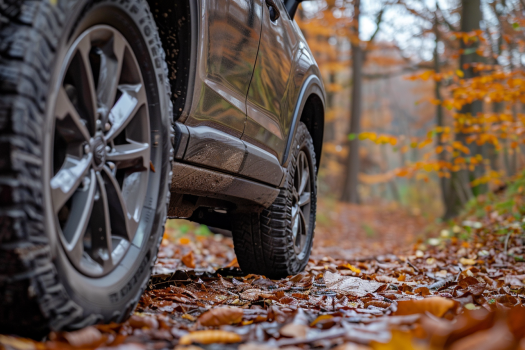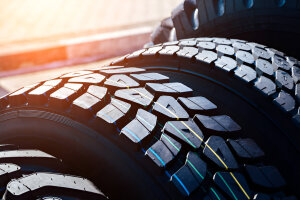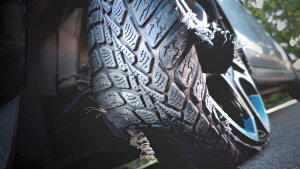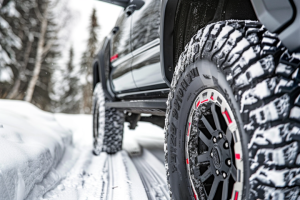Last Updated on September 14, 2025
Welcome to the 2024 Guide to Selecting the Best All-Season SUV Tires
As we venture into 2024, the automotive landscape continues to evolve, bringing forward advancements in tire technology that promise enhanced performance, safety, and environmental sustainability. At Tires Easy Truck, we guide SUV owners through the maze of tire choices, ensuring your vehicle has the best all-season tires to meet your driving needs. This article is meticulously crafted to provide comprehensive insights into selecting the right all-season SUV tires for 2024.

We’ll be delving deep into the essentials of all-season SUV tires, including key features and benefits, how they compare to other tire types, and what to look for when choosing tires for your SUV. Our goal is to equip you with the knowledge to make informed decisions and ensure that your SUV is outfitted with tires that offer a harmonious balance of performance, safety, and efficiency.
So, stay tuned as we explore the top all-season SUV tires for 2024, offering recommendations that span premium, mid-range, and budget-friendly options. Whether navigating city streets, cruising on highways, or embarking on off-road adventures, Tires Easy Truck ensures that your SUV is ready for the journey ahead.
Defining All-Season Tires
All-season tires represent a compromise designed to perform in various conditions, from dry pavement to wet roads and light snow. Engineered for versatility, they are equipped with tread patterns and rubber compounds optimized for durability and performance throughout the year. Unlike specialized tires that excel in specific conditions, all-season tires aim to offer a balanced performance across the seasons, making them a practical choice for drivers in moderate climates.
How They Compare: All-Season vs. Winter vs. Summer Tires
When selecting the right tires for your vehicle, understanding the differences between all-season, winter, and summer tires is crucial for optimizing performance, safety, and comfort throughout the year. Each tire type is engineered with specific features to excel in particular weather conditions and temperatures, making the choice highly dependent on your regional climate, driving habits, and performance expectations. This introduction aims to shed light on the key characteristics, advantages, and limitations of all-season, winter, and summer tires, providing you with the knowledge needed to make an informed decision that aligns with your driving needs across the seasons.
All-Season Tires
As mentioned, they are designed for versatility, providing adequate performance in various driving conditions. They are jacks of all trades but do not excel in one area.
Winter Tires
They are specifically designed for cold weather and snowy or icy conditions. They feature deeper tread depths and biting edges for increased traction on snow and ice. The rubber compound of winter tires is formulated to stay soft and flexible at lower temperatures for better grip.
Summer Tires
Optimized for warm weather, summer tires offer superior dry and wet road performance. They have a softer rubber compound for increased traction in warm conditions, but can become complex and brittle in cold temperatures, decreasing their effectiveness.
Importance of Selecting the Right All-Season SUV Tires
You must understand that all-season SUV tires are critical to your vehicle’s overall performance and safety. These tires are designed to provide balanced performance in various driving conditions, from dry and wet roads to light snow and ice. The importance of selecting the right all-season tires for your SUV cannot be overstated, as they directly impact:
- Safety: The right tires significantly enhance your vehicle’s grip and braking performance on various surfaces, reducing the risk of accidents in unpredictable weather conditions.
- Performance: Well-chosen all-season tires improve handling, cornering, and stability, ensuring a smoother and more responsive driving experience.
- Comfort: High-quality all-season tires are engineered to reduce road noise and absorb shocks, offering a more comfortable ride.
- Fuel Efficiency: The proper tire selection can improve fuel efficiency, as tires with low rolling resistance require less energy to move, reducing fuel consumption and emissions.
- Cost-Effectiveness: Investing in the right all-season tires can be more economical in the long run. High-quality tires tend to wear more evenly and last longer, reducing the frequency of tire replacements.
- Environmental Impact: With a growing emphasis on sustainability, selecting eco-friendly all-season tires reduces your carbon footprint through improved fuel efficiency and environmentally conscious materials.
2024’s Top All-Season SUV Tires
Selecting the right all-season tires for your SUV is a critical decision that affects your vehicle’s performance, safety, and comfort. The market offers a wide range of tires, catering to different preferences and budgetary considerations. Here, we’ll provide an overview of the top all-season SUV tires for 2024, segmented into premium selections, best-value picks, and budget-friendly choices.
Premium Selections: Features, Advantages, and Investment
In all-season SUV tires, premium selections stand out for their superior quality, advanced technology, and unmatched performance. These tires represent the pinnacle of tire engineering, offering features designed to enhance safety, extend durability, and optimize driving comfort across various conditions. From improved tread life to exceptional handling in wet and dry conditions, premium tires provide assurance and performance that justifies their upfront cost, making them a wise long-term investment in your vehicle’s performance and safety.
- Features: Premium all-season SUV tires are designed with the latest tire technology, offering superior performance in wet and dry conditions and light snow. These tires often feature advanced tread compounds for improved grip and handling, reinforced sidewalls for better load-bearing capabilities, and innovative tread designs for longer life.
- Advantages: The primary benefit of premium tires is enhanced safety and performance. These tires offer exceptional handling and stability, shorter braking distances, and superior comfort and noise levels. Moreover, due to the high-quality materials and construction, they tend to have a longer lifespan, providing better long-term value.
- Investment: While premium all-season SUV tires have a higher upfront cost, the investment is justified by their durability, performance, and overall driving experience. Premium tires are worth the investment for drivers who prioritize safety and performance and spend much time on the road.
Best Value Picks: Quality at an Accessible Price Point
Discovering the best value picks in tires means finding options that offer a remarkable balance of quality and affordability. Here, we’ll focus on tires that deliver reliable performance, durability, and safety features without breaking the bank, ensuring you get the most bang for your buck in terms of long-term value and driving satisfaction.
- Features: The best-value all-season SUV tires balance cost and performance. These tires offer good performance in various driving conditions and are made with durable materials to ensure a decent lifespan. They may not have all the advanced features of premium tires, but they still provide a safe and comfortable driving experience.
- Advantages: The main advantage of best value picks is their excellent balance of price and performance. These tires are ideal for drivers looking for reliable performance without the premium price tag. They offer good traction and handling in most driving conditions, making them a practical choice for everyday driving.
- Investment: Best-value tires represent an intelligent investment for the average SUV owner. They provide a cost-effective solution that meets the needs of most drivers, offering safety and performance that exceed basic requirements without breaking the bank.
Budget-Friendly Choices: Economical Without Sacrificing Performance
Finding affordable tires doesn’t mean you have to sacrifice quality. So, you can explore budget-friendly options that still offer safety, durability, and efficiency. You can get reliable tires without spending too much, ensuring your vehicle is well-equipped for your driving needs.
- Features: Budget-friendly all-season SUV tires are designed to meet drivers’ basic needs at a lower price point. These tires require advanced technology and materials in higher-end options but perform adequately in various conditions.
- Advantages: Budget-friendly tires’ primary advantage is their affordability. These tires suit drivers with limited SUV usage, such as short commutes or city driving, who want a tire that meets safety standards without a significant investment.
- Investment: Budget-friendly tires are the most economical option, offering the lowest upfront cost. While they may not provide the longevity or high-end performance of premium or value picks, they are viable for drivers with less demanding driving conditions or those looking for a short-term solution.
Special Considerations for Different Types of SUVs
When selecting all-season tires for your SUV, you must consider the specific type of vehicle you’re equipping. SUVs come in various shapes and sizes, from compact models designed for efficiency and maneuverability to full-size versions prioritizing space and towing capacity. Additionally, the distinction between passenger SUV tires and those with light truck (LT) ratings further complicates the selection process. Understanding these nuances can help you tailor your tire choice to your vehicle’s needs, ensuring optimal performance and safety.
Compact vs. Full-Size SUVs: Tailoring Your Tire Choice
Compact SUVs are designed for drivers who appreciate an SUV’s higher position, increased visibility, and versatility but in a more manageable size for urban driving. When selecting tires for a compact SUV, look for options that offer:
- Enhanced fuel efficiency: Lighter tires with lower rolling resistance can help maintain the vehicle’s fuel economy.
- Good handling and responsiveness: Tires with a good grip and shorter braking distances can improve the driving experience in urban environments and on highways.
- Comfort and low noise: A quieter tire can significantly improve ride quality since compact SUVs are often used for daily commuting.
Full-size SUVs require tires that can handle additional weight and towing demands. For these vehicles, consider tires that provide:
- Higher load capacity: Look for tires with a suitable load rating to accommodate the heavier weight of full-size SUVs and any potential towing or cargo needs.
- Durability: Tires designed for higher wear resistance are beneficial for vehicles that carry more weight or are used for towing.
- All-terrain capabilities: For full-size SUVs used in off-road conditions or for varied adventures, all-season tires with all-terrain features can offer the versatility needed for different driving surfaces.
Light Truck (LT) Ratings Explained
Tires with a Light Truck (LT) rating are designed for vehicles that carry heavy loads or perform towing duties, such as full-size SUVs and pickup trucks. LT-rated tires differ from Passenger (P) tires in several key aspects:
- Construction: LT tires are typically more robust than P tires, with reinforced sidewalls and higher ply ratings for heavier loads.
- Air Pressure: LT tires can usually be inflated to higher pressures, which is essential for supporting heavy loads and ensuring tire stability.
- Durability: With their robust construction, LT tires are generally more durable and offer better resistance to punctures and other damage in heavy-duty use.
Choosing between LT and P-rated tires depends on your SUV’s use. LT-rated tires may offer the performance and safety margins you need if you frequently carry heavy loads, tow trailers, or venture off-road. However, for everyday driving and lighter use, P-rated tires provide a more comfortable ride with adequate performance.
Navigating SUV Weight and Performance Needs
Your SUV’s weight and performance needs are crucial in selecting the right all-season tires. Heavier SUVs require tires with higher load ratings to safely support the vehicle’s weight, especially when fully loaded with passengers and cargo. Performance needs like high-speed stability, off-road capability, or winter weather performance also influence tire choice.
Consider the following when matching tires to your SUV’s weight and performance requirements:
- Review your vehicle’s specifications: Consult your owner’s manual or the vehicle’s placard for recommended tire sizes, load ratings, and pressure settings.
- Assess your driving conditions: Consider the typical driving conditions, including climate, road types, and whether you drive predominantly in urban or rural areas.
- Prioritize safety and performance: Choose tires that balance safety features, such as wet grip and braking efficiency, with performance characteristics that match your driving habits.
Choosing the Right All-Season Tires for Your SUV
Selecting the appropriate all-season tires for your SUV is crucial for ensuring optimal performance, safety, and longevity. Understanding the nuances of tire specifications, tread patterns, and the composition and structure of the tire can significantly impact your decision-making process. So, here are the critical aspects to aid you in choosing the best all-season tires for your SUV.
Understanding Tire Specifications: Load Rating, Speed Rating, and Size
Load Rating: A tire’s load rating, often called the load index, indicates the maximum weight each tire can support when fully inflated. This specification is paramount for SUVs, which are typically heavier and may be used for hauling or towing. Choosing a tire with an inadequate load rating can result in tire failure and potentially hazardous driving conditions. Always consult your vehicle’s manual or the driver’s side door jamb placard to find the recommended load rating for your tires.
- Speed Rating: A tire’s speed rating signifies the maximum speed at which it can safely carry a load under specified conditions. It is denoted by a letter, such as T, H, or V, each corresponding to a maximum speed in miles per hour. While SUVs may not always be used for high-speed driving, selecting a tire with an appropriate speed rating ensures durability and optimal performance. A higher speed rating usually indicates better handling characteristics, which can benefit emergency maneuvers and stability.
- Size: Tire size is critical for ensuring the tire fits your SUV correctly. It affects the vehicle’s handling, maneuverability, and safety. The tire size is a series of numbers and letters on the tire’s sidewall, indicating the tire’s width, aspect ratio, and diameter. Incorrect tire size can lead to increased wear and tear, reduced fuel efficiency, and compromised safety. Always choose tires that match the size recommendations provided by the vehicle manufacturer.
Tread Patterns: What You Need to Know
Tread patterns significantly affect a tire’s performance, especially for all-season tires that handle various road conditions. There are three main types of tread patterns:
- Symmetrical Tread Patterns are the most common type, offering a good balance of wear and noise level. They are designed for efficiency and longevity, making them suitable for everyday driving in moderate conditions.
- Directional (Unidirectional) Tread Patterns: Designed to rotate in one direction. These tread patterns are optimized for water evacuation, reducing the risk of hydroplaning. They are ideal for regions with heavy rainfall.
- Asymmetrical Tread Patterns: Combine the features of symmetrical and directional treads. They offer superior handling and grip on both dry and wet roads. These patterns are often found on high-performance all-season tires.
Choosing the correct tread pattern depends on your typical driving conditions and the performance you expect from your tires.
Maintenance and Care for All-Season Tires
Proper maintenance and care are paramount for maximizing the longevity and performance of your all-season tires. Regular maintenance extends the life of your tires and ensures your safety and the safety of others on the road. Therefore, below are the essential practices for routine maintenance, tips for recognizing signs of wear, and seasonal care tips to keep your all-season tires in optimal condition.
Routine Maintenance: Ensuring Longevity and Performance
Routine maintenance is the cornerstone of ensuring any vehicle’s longevity and optimal performance.
- Regular Inspections: Conduct visual inspections of your tires monthly. Look for signs of uneven wear, cracks, bulges, or objects that may have penetrated the tire. Early detection of these issues can prevent further damage and potential tire failure.
- Tire Pressure Checks: Tire pressure should be checked at least once a month and before long trips. Proper inflation is critical for tire longevity, performance, and fuel efficiency. Under-inflated tires can lead to uneven wear, reduced handling, and increased fuel consumption, while over-inflated tires can make the ride harsher and increase the risk of impact damage.
- Rotation Schedule: Regular tire rotation, typically every 5,000 to 8,000 miles, ensures even tire wear and extends the life of your tires. Follow your vehicle’s manufacturer’s recommendations on rotation patterns and frequency.
- Alignment Checks: Check your vehicle’s alignment annually if you notice uneven tire wear or your vehicle pulling to one side. Proper alignment ensures your tires wear evenly and extend their lifespan.
- Balancing: Tires should be balanced when mounted on wheels for the first time or when remounted after repair. Unbalanced tires can lead to vibration, excessive tire wear, and damage to suspension components.
Recognizing Signs of Wear and When to Replace Your Tires
Recognizing the signs of wear on your tires is critical for maintaining your vehicle’s safety and performance.
- Tread Depth: The minimum legal tread depth in most states is 2/32 of an inch. To check your tread depth, use a tread depth gauge or the penny test (insert a penny into the tread groove with Lincoln’s head upside down; if you can see the top of Lincoln’s head, it’s time to replace your tires).
- Wear Indicators: Modern tires come with tread wear indicators that become visible as the tire wears down. If these indicators appear flush with the tread, it’s time for new tires.
- Age: Tires degrade over time, even if they’re not used. Replacing tires every six years, regardless of tread wear, is recommended as the rubber compounds break down and lose effectiveness.
Seasonal Care Tips for Optimal Tire Health
Seasonal changes can significantly impact the condition and performance of your tires. Here are the essential tips on maintaining optimal tire health throughout the year, ensuring your tires remain in top condition, ready to tackle the challenges of each season with confidence and safety.
- Spring and Summer: Check tire pressure regularly, as rising temperatures can increase tire pressure. Inspect tires for damage from winter driving and ensure they are rotated and aligned as needed.
- Fall and Winter: Prepare for colder temperatures by checking tire pressure more frequently. Cold air can decrease tire pressure, affecting traction and fuel efficiency. Consider winter tires if you live in an area with severe winter conditions.
- Storage: If you switch between all-season and winter tires, store the off-season set in a cool, dry place away from direct sunlight and ozone sources like electric motors. Keep them upright and covered to protect against dust and moisture.
Installation Guidance and Ongoing Care for All-season SUV Tires
Proper installation and ongoing care are crucial for maximizing the performance and lifespan of your all-season SUV tires. Ensuring your tires are correctly installed and maintained can significantly affect your vehicle’s safety, efficiency, and overall driving experience.
Professional Installation: Why It Matters
- Accuracy in Installation: Professional tire installation ensures your tires are correctly mounted and seated on the wheel rims. Technicians use specialized equipment to balance the tires accurately, preventing vibrations that can lead to uneven wear and a compromised ride quality.
- Safety Checks: During installation, trained professionals thoroughly inspect the new tires, rims, and wheel components. This includes checking for damage or wear that could affect the vehicle’s safety and performance.
- Correct Tire Pressure: Inflating tires to the manufacturer’s recommended pressure is crucial for safety, fuel efficiency, and tire longevity. Professionals use precise tools to adjust tire pressure accurately, considering your SUV’s specific needs.
- Valuable Advice: Tire professionals can provide practical advice on the best tires for your vehicle, considering your driving habits and local weather conditions. They can also recommend a maintenance schedule to keep your tires in optimal condition.
DIY Tire Care: Rotation, Alignment, and Balancing Basics
Effective DIY tire care, encompassing rotation, alignment, and balancing, is essential for maintaining your vehicle’s performance and extending tire life.
- Tire Rotation: Regular tire rotation helps ensure even tire wear, extending the life of your tires. For most vehicles, it’s recommended to rotate the tires every 5,000 to 8,000 miles. The rotation pattern can vary depending on the tire type and vehicle drivetrain, so refer to your vehicle’s owner manual or consult a professional if unsure.
- Alignment Checks: Proper alignment is crucial for preventing uneven tire wear. Signs that your vehicle may need an alignment include pulling to one side while driving or uneven wear on the tire edges. Although adjusting the alignment typically requires professional equipment, drivers should know these signs and seek service when necessary.
- Balancing: Tires should be balanced when installed and during routine tire rotations. Balancing ensures that weight is evenly distributed around the entire wheel and tire assembly circumference, preventing vibration and promoting even tire wear. While balancing requires specialized equipment, understanding its importance is part of responsible tire care.
Real-World Insights: Customer Reviews and Comparative Analysis
Customer reviews and comparative analyses offer invaluable insights beyond manufacturers’ specifications and marketing materials in searching for the best all-season SUV tires. These real-world perspectives shed light on how various tire models perform under everyday conditions, highlighting the impact of the right tires on driving experience, safety, and vehicle efficiency.
Customer Success Stories: How the Right Tires Made a Difference
Real-life customer experiences often highlight the transformative effect of choosing the correct set of tires for their SUVs. For instance, many drivers report significant improvements in handling and stability after upgrading to higher-quality all-season tires, noting a marked difference in comfort and confidence while driving in adverse weather conditions.
- Enhanced Safety: Numerous customer stories underline the role of premium all-season tires in enhancing safety. Drivers recount situations where improved grip and shorter braking distances made a critical difference in avoiding accidents, especially on wet or icy roads.
- Increased Comfort and Reduced Noise: Another common theme among success stories is increased driving comfort. Advanced tread designs and rubber compounds improve road handling and reduce tire noise, making long drives more enjoyable.
- Improved Fuel Efficiency: Some customers are surprised by the noticeable improvement in fuel efficiency after switching to tires with low rolling resistance. These stories underscore the economic benefits of selecting the right tires, as the savings on fuel costs can be substantial over time.
Head-to-Head: How Top Tires Stack Up in Real-World Conditions
Comparative analyses conducted by automotive experts and consumer organizations offer a more structured approach to evaluating tire performance across different brands and models. These head-to-head comparisons typically assess tires on various criteria, including traction, handling, comfort, noise level, and wear rate.
- Traction and Handling: Comparative tests often reveal significant differences in how well tires maintain grip in various conditions, including dry, wet, and snowy roads. Premium all-season tires usually excel in these tests, providing consistent performance across driving conditions.
- Durability and Wear: Longevity is a critical factor for many drivers, and comparative analyses frequently include wear tests to estimate how many miles tires can be expected to last. Tires with a higher treadwear rating offer better long-term value, even with a higher upfront cost.
- Comfort and Noise: Ride comfort and noise levels are somewhat subjective but essential factors in tire selection. Comparative reviews help identify tires that offer a smoother ride and lower noise levels, contributing to a more pleasant driving experience.
- Fuel Efficiency: Some comparative tests measure the impact of tires on fuel consumption, highlighting models that help reduce fuel costs through efficient design and materials. These findings are precious for drivers looking to optimize their vehicle’s efficiency.
Comprehensive Buying Guide for 2024: All-Season SUV Tires
Purchasing new tires significantly improves your vehicle’s performance, safety, and efficiency. With 2024’s latest offerings in the tire market, consumers have more options than ever. We aim to simplify the tire-buying process by focusing on decoding tire sizes and labels, comparing online versus in-store purchases, and understanding warranties to ensure you make an informed decision.

Decoding Tire Sizes and Labels
Tire Size: The size of a tire is indicated by a series of numbers and letters printed on its sidewall, representing its specific dimensions. For example, a tire marked as “P225/65R17 102H” can be decoded as follows:
- P: Type of tire (P for Passenger vehicle)
- 225: Width of the tire in millimeters
- 65: Aspect ratio (height is 65% of the width)
- R: Construction type (R for Radial)
- 17: The diameter of the wheel in inches that the tire is designed to fit
- 102: Load index (indicates the maximum load the tire can carry)
- H: Speed rating (indicates the maximum speed at which the tire can safely operate)
Labels: Tires also contain labels on fuel efficiency (rolling resistance), wet grip (braking performance), and noise levels. These labels help consumers compare tires based on these critical performance characteristics.
Understanding how to read tire sizes and labels is crucial for selecting the right SUV tires and ensuring they meet your vehicle’s requirements and driving needs.
Navigating the Purchase: Online vs. In-Store
Deciding where to purchase your next set of tires—online or in-store—presents a modern dilemma for many drivers. But here are the conveniences and considerations of both buying platforms, helping you navigate the benefits and drawbacks to find the best purchasing path for your needs.
Online Purchasing:
Online purchasing has revolutionized how we shop, offering unparalleled convenience and access to a vast selection of products from the comfort of our homes.
- Advantages: Shopping for tires online offers convenience, a broader selection, and the ability to compare prices and reviews easily. Many online retailers provide detailed guides and tools to help select the right tire.
- Considerations: Verify the tire specifications and ensure they match your vehicle’s requirements. Additionally, arrange for installation, which can be a separate expense.
In-Store Purchasing:
In-store purchasing offers a hands-on approach to buying tires, allowing customers to directly consult experts and inspect products before deciding. This traditional shopping experience provides immediate professional advice and personalized service to ensure you find the perfect fit for your vehicle.
- Advantages: Buying tires from a physical store allows you to speak directly with experts who can provide advice and answer questions. Immediate availability and professional installation are also significant benefits.
- Considerations: In-store selections might be more limited than online options, and pricing may vary. However, the ability to negotiate prices and the inclusion of additional services can offset these factors.
Both purchasing methods have their merits, and your choice will depend on your preferences for convenience, advice, and pricing.
Conclusion
As we wrap up this ultimate guide, we aim to empower you with the knowledge and confidence to select the perfect all-season SUV tires for your vehicle in 2024. Making the right tire choice is about balancing your needs with the vast options available, ensuring your car can handle whatever the road brings in any season.
Now that you are ready to make an informed tire purchase, why not explore the extensive selection available at Tires easy truck? Our website, Tires Easy Truck, offers a wide range of all-season SUV tires from leading manufacturers designed to meet the diverse needs of today’s SUV drivers. With easy navigation, detailed product information, and helpful customer service, finding and buying the right tires has never been easier.
Shop now at Tires Easy Truck, your destination for the perfect all-season SUV tires. Our expert team is here to assist you in making the best choice for your SUV, ensuring you enjoy optimal performance, safety, and satisfaction on the road in 2024 and beyond.
Tires easy truck covers, whether you want premium durability, unmatched performance, or eco-friendly options. Make the smart choice today and equip your SUV with tires that define excellence.
FAQS
1. Can all-season tires be used in snow?
All-season tires are designed to handle various road conditions, including light snow. However, they are not a substitute for winter tires in areas with heavy snowfall or severe winter conditions.
2. How long do all-season tires last?
The lifespan of all-season tires varies depending on their quality, driving habits, and maintenance. On average, they can last between 40,000 and 70,000 miles.
3. Are all-season tires suitable for off-road driving?
While all-season tires provide adequate performance on light off-road terrain, they are not specifically designed for off-road conditions. Specialized tires are recommended for regular off-road driving.
4. How can I tell if my all-season tires need replacing?
Check the tread depth. If it is below 2/32 of an inch, it’s time to replace your tires. Also, look for signs of uneven wear, cracks, or bulges on the tire’s surface.
5. Do all-season tires come with a warranty?
Yes, almost all-season tires come with a manufacturer’s warranty covering defects in materials and artistry. Some also offer tread life warranties.
6. How often should I rotate my all-season tires?
Rotating your tires every 5,000 to 8,000 miles is recommended to ensure even wear and extend their lifespan.
7. Can I mix all-season tires with other types of tires?
Mixing tire types is not recommended, as it can affect the vehicle’s handling and safety. All four tires should be the same type, brand, and model.
8. Are all-season tires more expensive than summer or winter tires?
The cost of all-season tires is generally comparable to summer or winter tires. However, since they can be used year-round, they may offer better value over time.
9. Do all-season tires improve fuel efficiency?
Tires with low rolling resistance, including some all-season tire models, can improve fuel efficiency by reducing the energy needed to move the vehicle.
10. How do I choose the right all-season tires for my SUV?
Consider your driving conditions, vehicle specifications, and personal driving habits. Also, read customer reviews and professional ratings to find tires that best suit your needs.










